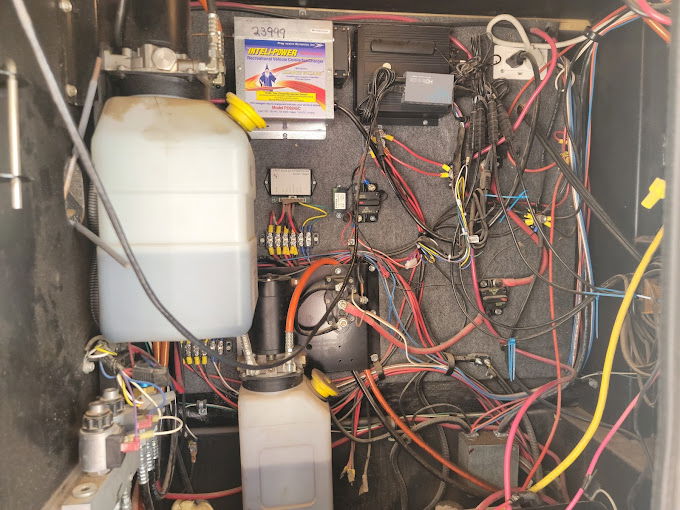
Owning an RV opens up endless adventures, but it also comes with its share of challenges, especially when it comes to electrical issues. Whether you're new to RVing or have been doing it for years, understanding and troubleshooting electrical problems can be intimidating. Don’t worry, though; most issues are easy to diagnose and fix. This guide will walk you through common RV electrical problems and provide troubleshooting tips to keep your RV running smoothly. Let’s get started!
Common Electrical Problems in RVs
RV electrical problems can arise from a variety of sources. Knowing what to look for is the first step in fixing these issues. Here are some of the most common electrical problems you might encounter:
Dead Battery
A dead or weak battery is one of the most frequent issues RVers face. This can be caused by leaving lights or appliances on, a failing alternator, or simply an aging battery.
Faulty Power Outlets
If your power outlets aren’t working, the issue might be related to a tripped circuit breaker, blown fuse, or faulty wiring. Sometimes the problem is as simple as a bad outlet that needs replacement.
Flickering or Dimming Lights
Flickering lights are usually a sign of poor battery health, loose wiring, or a problem with the power source. It could also indicate a problem with your converter.
Malfunctioning Appliances
If your refrigerator, microwave, or air conditioning unit isn’t working properly, it could be an electrical problem rather than a malfunction of the appliance itself. Check the power supply to ensure they’re getting enough voltage.
Tools You Need for Troubleshooting RV Electrical Problems
Before diving into troubleshooting, it’s essential to have the right tools on hand. Here are some must-haves:
Multimeter
A multimeter helps you measure voltage, current, and resistance in your RV’s electrical system. This is essential for diagnosing battery issues and faulty circuits.
Electrical Tape and Connectors
Having these on hand is vital for securing loose connections or insulating exposed wires.
Wire Strippers and Pliers
You may need to strip wires or tighten connections during your troubleshooting process. A good pair of pliers and wire strippers will make the job easier.
Surge Protectors and Circuit Testers
To prevent future issues, you should always use a surge protector to protect your RV from power spikes. A circuit tester is also useful for checking if outlets are receiving power.
How to Troubleshoot RV Electrical Problems
Now that you have the tools, let’s go step by step to troubleshoot some common RV electrical problems.
Step 1: Check the Power Source
The first thing to check is your power source. Are you connected to shore power at a campsite, running on a generator, or relying on your RV’s batteries? If you’re using shore power or a generator, make sure the connection is secure, and check for any external power issues.
Step 2: Inspect the Circuit Breaker
If the power source seems fine but your electrical system still isn’t working, check the circuit breaker panel inside your RV. A tripped breaker or blown fuse could be the culprit. Reset any tripped breakers and replace blown fuses as necessary.
Step 3: Test the Battery
If your RV’s battery is the issue, you’ll need to check its voltage using a multimeter. If the reading is low (below 12.4 volts), the battery might need charging or replacing.
Step 4: Investigate Wiring Issues
Loose or damaged wires can cause a variety of electrical problems. Inspect wiring throughout your RV, especially near outlets, lights, and the battery compartment. If you notice any frayed or disconnected wires, fix them with electrical tape or connectors.
Also Read - how to check rv electrical system

Troubleshooting 12V DC vs. 120V AC Systems
Your RV’s electrical system operates on two different types of power: 12V DC and 120V AC. Understanding the differences can help you diagnose issues more accurately.
12V DC System Issues
The 12V DC system powers things like your RV lights, water pump, and fans, all of which run off the battery. If you’re having trouble with these components, the issue is likely with the battery or wiring connected to it.
120V AC System Issues
The 120V AC system is what powers your larger appliances like the air conditioner, microwave, and outlets. These are powered either through shore power, a generator, or an inverter. Problems here could stem from faulty power sources, bad wiring, or a tripped breaker.
Preventive Measures to Avoid RV Electrical Problems
While it’s important to know how to troubleshoot electrical problems, preventing them in the first place is even better. Here are some simple preventive steps:
Regular Battery Maintenance
Make sure to check your battery's water levels (if applicable) and clean the terminals regularly. Replace aging batteries before they cause problems on the road.
Protect Your RV from Power Surges
Always use a surge protector when plugging into shore power to prevent damage from power spikes. This simple device can save you from a lot of headaches.
Check Electrical Connections Periodically
Loose or corroded connections can lead to big problems down the road. Take a few minutes to inspect your RV’s electrical system every few months.
When to Call a Professional
While many RV electrical problems can be handled by beginners, some issues are better left to the experts. If you notice burning smells, see sparks, or if your RV’s electrical system continues to malfunction after troubleshooting, it’s time to call a professional. Electrical issues can be dangerous if not handled properly.
Conclusion
Dealing with RV electrical problems can seem overwhelming at first, but with a little knowledge and the right tools, most issues are simple to fix. Always start by checking the basics like your power source, circuit breaker, and battery health. With regular maintenance and some preventive measures, you’ll minimize the chances of running into electrical issues on the road. Safe travels!
Also Read - Common RV Electrical Problems and How to Fix Them
FAQs
Why does my RV battery drain quickly?
Several factors can cause your RV battery to drain quickly, including leaving lights or appliances on, phantom loads (like clocks or electronics), or a faulty converter.
How can I prevent my RV’s lights from flickering?
Check your battery’s charge and ensure all connections are tight. If the flickering persists, inspect your converter or consider upgrading your lights to more energy-efficient LEDs.
What should I do if my RV power outlets aren’t working?
Start by checking the circuit breaker and fuses. If they are fine, use a circuit tester to ensure the outlet is receiving power. If not, the issue may be with the wiring.
Can I use a regular surge protector in my RV?
No, it’s recommended to use an RV-specific surge protector that can handle the unique electrical needs and potential power surges associated with campgrounds.
How often should I check my RV’s electrical system?
It’s a good idea to inspect your RV’s electrical system every few months, especially before and after long trips. Regular checks can help prevent major issues from developing.
